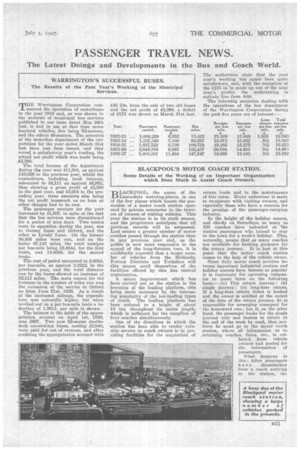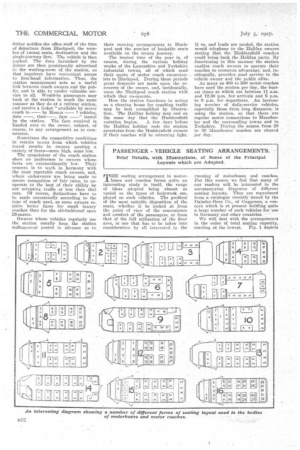• BLACKPOOL'S MOTOR COACH STATION.
Page 105

Page 106

If you've noticed an error in this article please click here to report it so we can fix it.
Some Details of the Working of an Important Organization which Does Much to Assist Coach Owners.
fl LACKPOOL, the queen of the J_ILancashire watering-places, is one of the few places which boasts the possession of a motor coach station operated by private enterprise in the interest ef owners of visiting vehicles. This year the station is in its sixth season, and the proprietors anticipate that all previous records will be surpassed. Last season a greater number cif motor coaches passed through the station than in any previous year and, as the public is now more responsive to the appeal of the long-distance tour, it is confidently expected that a larger nuni, ber of vehicles from the Midlands, Pottery Districts and Yorkshire will this season avail themselves of the facilities offered by this fine central organization.
A minor improvement which hasbeen carried out at the station is the lowering of the loading platform, this being made. necessary by the increasing popularity of the low-loading types of coach. The loading platform has been reduced to a height of about 18 ins, throughout its entire length, which is sufficient for the reception of four coaches simultaneously.
One of thc directions in which the station has been able to render valuable service to coach owners is in providing facilities for the acquisition of return loads and in the maintenance of fair rates. Every endeavour is made to co-operate with visiting owners, and especially those who have a concern for the prestige of the passenger-carrying industry.
In the height of the holiday season, and chiefly on Saturdays, as many as 150 coaches have unloaded at the station passengers who intend to stay in the town for a week's holiday. This, naturally, means that as many coaches are available for booking purposes for the return journey. It is -just at this point that the motor coach station comes to the help of the vehicle owner.
Since daily motor coach services between important industrial centres and holiday resorts have become so popular it is customary for operating companies to quote fares on the following basis :--(a) Day return journey; (b) single journey; (e) long-date return. If a long-date return ticket is booked and the owner is notified at the outset of the date of the return journey, he is responsible for arranging transport for the homeward run; but if, on the other hand, the passenger books for the single journey only and desires to return at the end of the week by road, then perforce he must go to the motor conch station, where all information as to .returning coaches, fares, etc., is collected from vehicle owners and posted for the information of passengers.
What happens is this: After passengers have disembarked from a coach arriving at the station, the driver notifies the office staff of the time of departure from Blackpool, the number of vacant seats, destination and the single-journey fare. The vehicle is then parked. The data furnished by the driver are then prominently advertised in the waiting-room of the station, so that inquirers have convenient access to first-hand information. Thus, the station management acts as a useful link between coach owners and the public, and is able to render valuable service to all. Would-be passengers may book at the station in much the Same manner as they do at a railway station, and receive a ticket " available by motor roach to — by Messrs — ? vehicles, date —, time—, fare —" issued by the station. The fare received is handed over to the owner, subject, of course, to any arrangement as to commission.
sometimes the competitive conditions in certain towns from which vehicles travel results 'in owners quoting a variety of fares—some high, some low.
The proprietors of the coach station show no preference to owners whose fares are extraordinarily low. Their concern is to work in harmony with the most reputable • coach owners, and, where endeavours are being made to 'secure recognition of fair rates, to cooperate to the best of their ability by not accepting traffic at less than that rate. Of course, distinctions have to be made occasionally according to the type of coach used, as some. owners require better fares for small luxury coaches than for the old-fashioned open 28-seater.
Owners whose vehicles regularly use the station usually keep the station management posted in advance as to their running arrangements to Blackpool and the number of booltable seats available on the return journey.
The busiest time of the year is, of course, during the various holiday weeks of the Lancashire and Yorkshire industrial towns, all of which send their quota of motor coach excursionists to Blackpool. During those periods great demands are made upon the resourees of the owner, and, incidentally, upon the Blackpool coach station with which they co-operate.
How the station functions in acting as a clearing house for coaching traffic may be best exemplified by illustration. The Halifax holiday may end on the same day that the Huddersfield vaeation begins. A few days before the Halifax holiday ends the station ascertains from the Huddersfield owners if their coaches will be returning light. If so, and loads are needed, the station would telephone to the Halifax owners stating that the Huddersfield coaches could bring back the Halifax party. By functioning in this manner the station enables (mach owners to operate 'their coaches to economic advantage, and, incidentally, provides good service to the vehicle owner and the public alike.
As many cc 400 to 500 motor coaches have used the.station per day, the-busiest times at which are between 11 a.m. and 12.30 p.m. for arrivals and 6 p.m. tn 9 p.m. for departures. An increasing number of daily,service vehicles, especially those from long distances, is using the station, so that there, are regular motor connections to Manchester -and the surrounding towns .and to Yorkshire. During the season from 20 to 30 Manchester coaches are cleared per day.












































































































































































